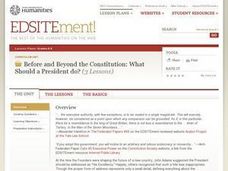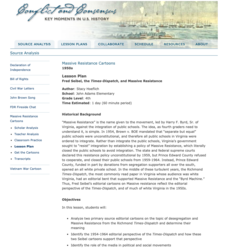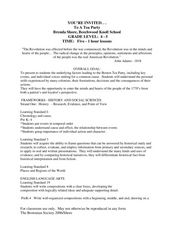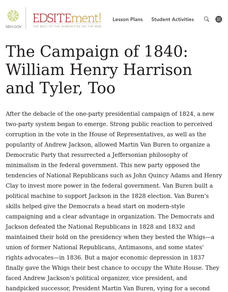C-SPAN
Judicial Review and Marbury v Madison
The Supreme Court case Marbury v. Madison may not be widely recognized but the landmark case is particularly significant because it established the precedent for judicial review and that the Supreme Court had power as an interpreter of...
National Endowment for the Humanities
Lesson 2: The United States, France, and the Problem of Neutrality, 1796–1801
While the French Revolution could be considered inspired by the American Revolution, it created thorny problems for the new United States. Should the United States get involved and be drawn into a European drama? Was the US strong...
Center for History Education
Women's Rights in the American Century
Today, many young people find it hard to understand why it took over 150 years for women in the United States to get the right to vote—why there was even a need for the suffrage movement. As they read a series of primary source...
Curated OER
Before and Beyond the Constitution: What Should a President Do?
Students discuss the powers and responsibilities of the President, list some precedents established during Washington's presidency, and match presidential actions with the type of Executive power it is.
Roy Rosenzweig Center for History and New Media
Fred Seibel, the Times-Dispatch, and Massive Resistance
A instructional activity challenges scholars to analyze editorial cartoons created by Fred Seibel, illustrator for the Times-Dispatch, during the Massive Resistance. A class discussion looking at today's editorial pages and Jim Crow Laws...
National Endowment for the Humanities
Background on the Patriot Attitude toward the Monarch
Learners explain the Patriot attitude toward the British monarchy, which helps them embrace the Founders' reluctance to have a strong executive under the Articles of Confederation as well as their desire to build in checks of executive...
Curated OER
Historical Background Leading to the Declaration of Independence
Students examine why, when our Fathers, signed the Declaration of Independence they were placing in jeopardy their freedom, property and lives.
National Endowment for the Humanities
The President Under the Articles of Confederation
The Articles of Confederation sounds like one big, fancy title to middle schoolers. Here, scaffolded steps help to ease novices into understanding this all-important American document. Discussion questions, lesson plan activities, and...
Curated OER
United States Constitution Framers
Students view a PowerPoint presentation based on the framers of the Constitution. Students create notes on each of the delegates featured. Using their notes, they write a paragraph on the Constitutional Convention delegate they believe...
Curated OER
You're Invited...To A Tea Party
Kids read the book Boston Tea Party by Steven Kroll and use maps to locate various landmarks. They identify the cause and effect of the events related to the Boston Tea Party, then write a descriptive composition.
Curated OER
Thomas Jefferson on the Sedition Act
Students research and cite arguments Jefferson used in objecting to the Sedition Act. They discuss Jefferson's opinion on how constitutional questions about the Sedition Act could be resolved.
National Endowment for the Humanities
Lesson 2: The Debate in Congress on the Sedition Act
Pupils research and discuss the provisions in the Constitution that supported the arguments for and against the Sedition Act. They articulate objections to and arguments in favor of the Sedition Act.
National First Ladies' Library
Politics! Politics! The Emergence of Political Parties in the U.S.
High schoolers are split into six small groups which focus on one of six websites, that tell the story of the emergence of the Federalist and Democratic-Republican parties at the end of the 18th century. They compile a chronological list...
Curated OER
Marbury v. Madison (1803)
Students examine federalism and judicial review. In this Supreme Court lesson, students examine primary documents from Marbury v. Madison and discuss the implications of the decision.
Curated OER
Boston Massacre Trial
Students participate in trial simulation following the Boston Massacre in which they use core map A to help present their evidence and testimony.
Curated OER
Turning Points in the American Revolution
Fifth graders examine the causes and effects of the American Revolution. In groups, they make a portfolio page and write a response to the Proclamation of 1763. They also make a timeline of the events of the Boston Massacre and answer...
National First Ladies' Library
Impeachment!
Young scholars investigate the impeachment proceedings against Andrew Johnson, Richard Nixon, and William Clinton. In small groups they conduct Internet research on one of the three Presidents, and present a "brief" on the case,...
Curated OER
Pod Cards: The White House, Washington D.C.
In this language arts worksheet, learners listen to a podcast of information about the White House. Students fill in missing words as they listen. Learners use a transcript to answer 15 questions about what they've heard and read.
Curated OER
United States Constitution Framers
Eighth graders discover details about delegates to the American Constitutional Convention. In this U.S. Constitution lesson, 8th graders research information about 9 delegates to the convention and then write paragraphs about the most...
Curated OER
TV ATTACK ADS AND THE VOTER
High schoolers read about the history of negative political advertisements in U.S. elections. In this politics lesson plan, students view several ads for opposing candidates and analyze and discuss the content. High schoolers write...
Curated OER
Paradise Lost: Concept Analysis
New to using Paradise Lost in your classroom? Here's a packet that provides background information, lists of research projects, and enrichment resources. A great addition to your curriculum file.
Curated OER
The Campaign of 1840: William Henry Harrison and Tyler, Too
High schoolers list some issues important during the campaign of 1840. They compare and contrast the careers of Martin Van Buren and William Henry Harrison before they became president and explain why the Whigs wanted to find a candidate...
Curated OER
Why Do We Remember Revere? Paul Revere's Ride in History and Literature
Students examine primary documents regarding Paul Revere's ride and its role in the Revolutionary War. They consider how Revere's role has been written about by Longfellow and others and discuss the discrepancies between accounts.
National Endowment for the Humanities
The Monroe Doctrine: A Close Reading
Students identify specific passages in the Monroe Doctrine to events in early U.S. diplomacy.
Other popular searches
- John Adams Foreign Policy
- John Adams Political Cartoon
- John Adams Presidency
- Presidency of John Adams
- President John Adams
- John Adams Second President
- John Adams Facts
- Activities for John Adams
- John Adams Letters
- John Adams on Dvd
- Letter to John Adams
- John Quincy Adams 1824

























